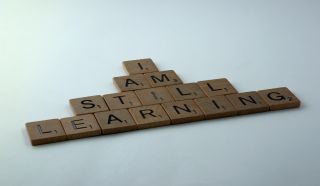Education
Find an Opportunity to Learn
Are you missing opportunities to grow stronger, happier, and more resilient?
Posted May 8, 2023 Reviewed by Michelle Quirk
Key points
- Let helpful, valuable, or enjoyable experiences sink in and become part of you.
- Experience whatever you wish to grow, and it must leave a lasting physical trace behind.
- Experiences are continually changing. Take in the good, and, over time, you will be increasingly filled up from the inside out.

I have been asked about my top-five inner practices, and here they are:
- Drop the stone
- Let it flow
- Find an opportunity to learn as you go
- “Us” all “thems”
- Be amazed
By “learn as you go,” I mean that each day is an opportunity to take in the good: to help useful or enjoyable experiences sink in and become a part of you. Then, when you go to sleep, you'll be a little stronger, a little more resilient, a little wiser, a little more loving, and a little happier than you were when you woke up in the morning.
This kind of learning is not memorizing a multiplication table. It’s emotional learning, somatic learning. It’s becoming more skillful with the world around you and the world inside you. It’s social learning, motivational learning, and even spiritual learning. It’s healing from the past and growing strengths for the future. It’s becoming more compassionate, confident, patient, capable, and joyful. This is the learning that matters most. If things fall apart, what’s already inside you is what you can really count on.
I grew up in a stable and loving home, but, for a variety of reasons, I was still very unhappy, awkward, and messed up inside. I didn’t know what to do, and it seemed hopeless. Then, at about age 15, there was a big turning point when I realized that no matter what things were like at the present time, I could always look for ways to learn and grow from there—to get more skillful, to heal, to grow. I didn't need to despair because it was in my power to develop myself in some way each day. To learn how to talk with other kids or not be so irritated by my parents, or deal with my crazy thoughts. To learn how to make my way in the world. And that was full of hope.
We can't do anything about the past, but—to quote Captain Kirk in Star Trek—the future is an undiscovered country. It's full of possibilities, including the possibilities of who you are becoming. No one can stop you from learning. And no one can do it for you—which makes the results authentic and yours to own.
The Practice
We’re having experiences all day long, but what actually sinks in? Usually, it’s the moments of stress and sorrow, anxiety and anger, hurt and resentment. Meanwhile, all the many experiences of gratitude, accomplishment, friendliness, feeling cared about, wholesome pleasure, insight, and commitment pass through us like water through a sieve. This is due to the brain’s evolved negativity bias, which makes it like Velcro for bad experiences but Teflon for good ones.
To beat the negativity bias and grow more of the good inside yourself, there are just two steps—but you have to do both of them.
Two Steps
First, you need to experience whatever you want to grow, such as insight, intention, skill, satisfaction, calming, easing, soothing, or vitalizing. Second, that experience must leave a lasting physical trace behind in neural structure or function. Otherwise, there is no lasting value, no healing, no growth, no learning.
The first step is usually easy. Most people are having many mildly pleasant or useful experiences each day and just have to notice them. And we can also create beneficial experiences, such as calling up the feeling of compassion or determination or remembering what it feels like to be with someone who cares about you.
Second, once the “song” of that experience is playing in your inner iPod, turn on the recorder. This is the step that people routinely skip in everyday life, and that therapists and coaches, and teachers (including myself) can fail to do when working with others. But, if we miss this step, we’ve wasted the experience on the brain.
There are lots of ways to use the power of “experience-dependent neuroplasticity” (that’s a mouthful) to turn passing experiences into grit and gratitude and other inner strengths hardwired into your nervous system. (For a summary, check out my book Resilient.) Try one of these or all three of them:
- Stay with the experience for a breath or two or longer. There’s a famous saying: “Neurons that fire together, wire together.” The longer you keep them firing, the more they will tend to connect together.
- Feel it in your body as much as possible. This is not about remembering specific events in your life, but about receiving the residues of lived experience into yourself.
- Focus on what is enjoyable or meaningful about it. As the sense of reward in an experience increases, dopamine and norepinephrine activity in the brain tends to increase as well. This flags experiences as “keepers” and prioritizes them for long-term storage.
You might take these two steps only a few times a day, usually less than a minute at a time. But, bit by bit, synapse by synapse, you’ll be growing happiness, love, and wisdom inside yourself.
Some Profound Implications
This practice is simple, down-to-earth, and natural. It’s also profound in a couple of ways.
First, experiences are continually changing; as Francis Bacon wrote: “We have only this moment, sparkling like a star in our hand and melting like a snowflake.” Yet, you can help them leave enduring tracks behind as they pass through consciousness. Remarkably, you can get lasting value from the melting moment even as you let go of it.
Second, as you take in the good over time, you feel increasingly filled up from the inside out. Then it feels like there is enough of a need met already, even as you cope with challenges. This reduces our biologically rooted tendencies toward “craving” based on a sense of something missing, something wrong. As we grow an unshakable core of resilient well-being, there is less push inside to fight pain, chase pleasure, or cling to other people.
Then our footprint on the world and others becomes lighter, and we also become harder to manipulate with fear or greed or “us against them” grievances and rivalries. We should certainly act to improve conditions in the world. But that is not sufficient, as we can see in the example of many privileged and affluent people who still see threats around every corner, can’t stop piling up more wealth no matter the cost, and dehumanize and bully others. The sense of enoughness must land in the heart and take root—and if it does in the hearts of enough people, that will change the course of human history.




